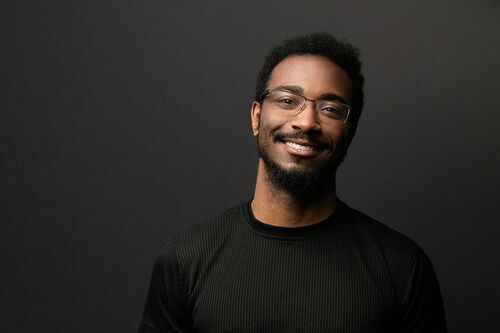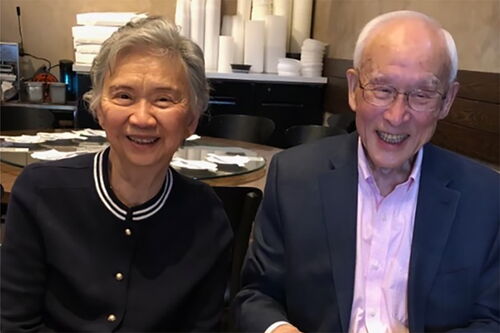Industrial strengths
Keith Westcott (MS, '78; PhD, '80, biochemistry) arrived at Amgen in 1986, just three years before this small, upstart biotechnology company started producing Epogen, a genetically engineered drug that boosts red blood cell counts in patients suffering from anemia. After Epogen hit the market, the company soared, and today it is one of the largest pharmaceutical companies in the world.
Besides bringing biotech benefits to patients, Amgen’s success was a boon to early employees like Westcott; but since his retirement in 1999, Westcott has not rested on his good fortune. He has used both his industrial experience and earnings during his Amgen years to give back, and one of the major beneficiaries has been his alma mater—the University of Illinois. This generosity of spirit has earned him the 2010 LAS Distinguished Service Award.
Westcott, a College of LAS alum in biochemistry, came to Amgen when it had fewer than 250 employees. In the early days, some workers rode bikes or clunker cars to work, and space was at a premium as scientists used tape on lab benches to mark off their 2 feet of precious work space.
Today, Amgen has over 15,000 employees worldwide. The company’s four leased office buildings when Westcott first arrived have expanded to a research campus that includes over 40 buildings, a large health club/spa (with on-site massages), seven cafeterias, an on-site childcare center, and even a dry cleaner and shoe repair service.
When Westcott came to Amgen, “it was a breath of fresh air,” he recalls. “There was a lot of excitement, a sense that we were creating a new industry. Everyone knew each other, all of the way from the chief executive officer through the dishwashers.”
This kind of camaraderie struck a familiar note with Westcott, for he found the same collegiality during his years as a graduate student at Illinois. But the road to U of I was not an easy one. Ironically, when Westcott applied to Illinois as an undergraduate in 1970, he was turned away. The Vietnam War was still raging, and with so many draft-age men applying for college, Illinois set up a lottery for those seeking to get in. Westcott did not make it.
So he turned to his backup school, the University of California at Berkeley, where he decided to merge his interests in both biology and chemistry by majoring in biochemistry—the chemistry of life.
“It was good timing,” Westcott says. “Scientists had just discovered the genetic code when I was in high school. And while I was an undergraduate, all of the work leading up to the biotech revolution was going on.”
When it came time to move on to graduate school, Westcott decided to take another stab at the U of I, and this time he had no trouble getting into the graduate program in biochemistry.
“The Illinois biochemistry department was a unique environment,” he says. “Everyone was on a first-name basis, from the most senior professors all the way through the graduate students and technicians. The various labs in the department collaborated, so there were a lot of opportunities to learn.”
After receiving his master’s degree in 1978 and his PhD in 1980 in biochemistry from Illinois, Westcott did post-doc work and then spent about nine months at Alpha Therapeutics in Los Angeles in 1985. This position did not really match his experience, so when he heard that a small start-up company in California was looking for protein scientists, he jumped at the chance.
At Amgen, Westcott found himself in the thick of the biotechnology revolution, doing work on separating proteins in a highly purified form. He also did extensive research on epidermal growth factor, which aimed to increase the healing time of skin grafts for burn victims.
As with many start-up companies in California in both computers and biotechnology, Amgen attracted research talent by giving equity interest in the company, he says. Westcott was given stock options, which went up 48-fold during his 13 years with Amgen, enabling him to retire in 1999. He says he didn’t mind the early exit because the company had become a large corporate entity and no longer had the small, entrepreneurial atmosphere.
“At least we still didn’t have to wear ties,” he says. “That one thing always holds true in California.”
After retirement, Westcott says he entered the philosophical part of his life and began learning how to manage his investments. Westcott never forgot the impact that the Illinois biochemistry program had in his life, so he decided to establish a charitable remainder trust of more than a million dollars with the U of I in 2006.
Since then, his ties with Illinois have only strengthened, even though he still lives in California. The contributions through his unitrust have gone toward fellowships for graduate students in biochemistry, and he comes back to campus to give overviews of pharmaceutical research to incoming biochemistry students. In addition, he is a member of the University of Illinois Foundation, he helps with numerous Foundation and alumni events, and he has assisted with the campaign to renovate biochemistry space in Roger Adams Lab.
Known for adding a personal touch to everything, Westcott has also returned to Illinois and twice taught a six-week course about protein and pharmaceutical biotechnology from an industrial perspective. He says he would like to expand his course and possibly create an additional class on drug discovery and development that draws on Illinois research.
“I want to give students some idea of what it’s like to work in industrial labs and how the challenges are both similar and different,” he says. “You’re doing the same kind of work, but you’re also working under commercial constraints in a regulated industry.”
Traditionally, a lot of biotechnology research has migrated to the coasts—California and Boston, specifically. “But I want to bring this kind of knowledge to the center of the country,” Westcott says. “I want students to know about the level of excitement and difficulty in industrial research. I want to do as much as I can.”








